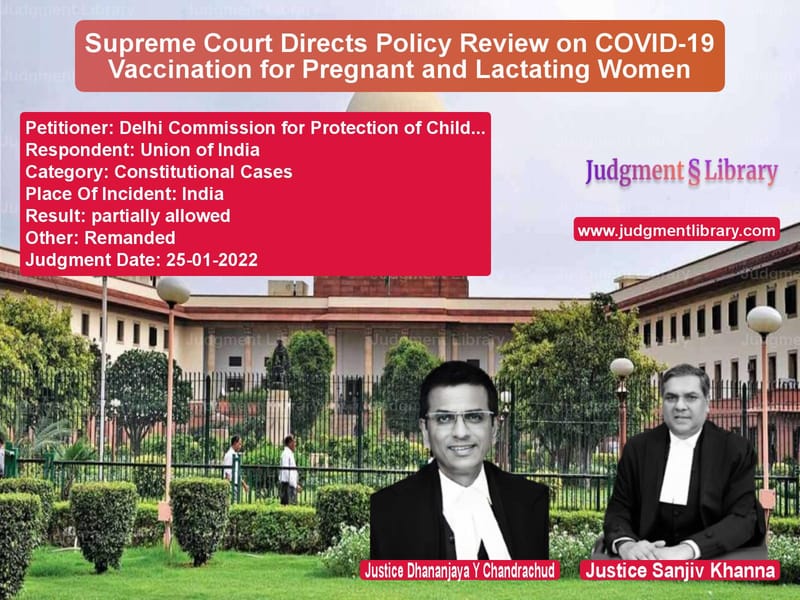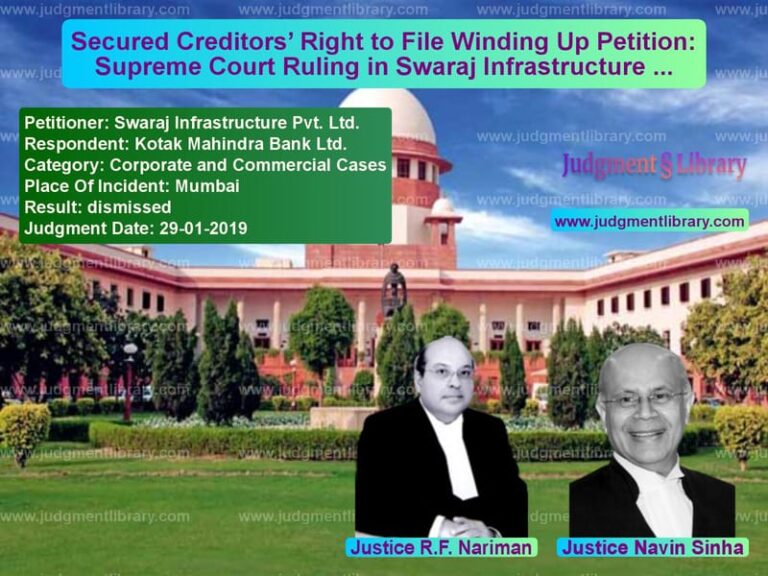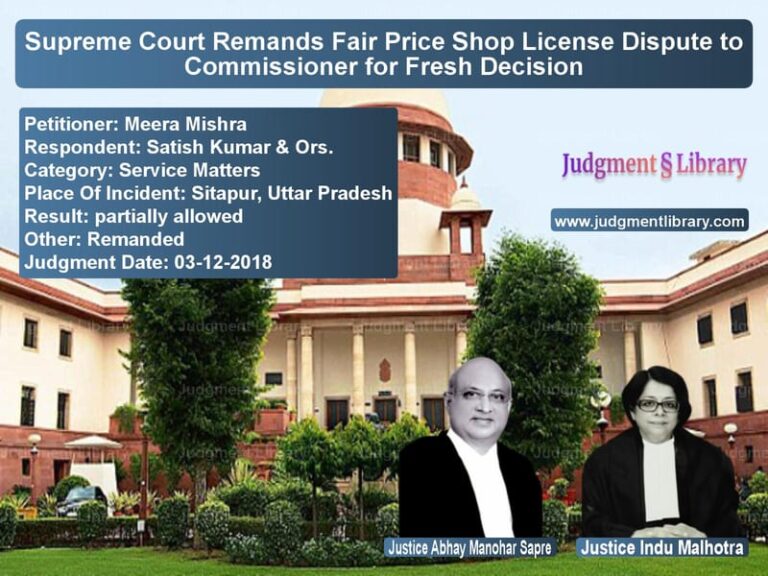Supreme Court Directs Policy Review on COVID-19 Vaccination for Pregnant and Lactating Women
The Supreme Court of India recently adjudicated a crucial case involving the Delhi Commission for Protection of Child Rights (DCPCR) against the Union of India. The petition, filed under Article 32 of the Constitution, sought the Court’s intervention in ensuring priority vaccination for pregnant women and lactating mothers amid the COVID-19 pandemic. The judgment, delivered by a bench comprising Justice Dr. Dhananjaya Y Chandrachud and Justice Sanjiv Khanna, directed the government to review and refine its vaccination policies based on expert recommendations.
Background of the Case
The DCPCR, a statutory body under the Delhi Government, filed the petition to ensure that pregnant women and lactating mothers received priority access to COVID-19 vaccines. The Commission raised concerns over the lack of targeted policies and specific mechanisms to track and monitor vaccinated women from this vulnerable category.
The petition sought multiple reliefs, including:
- Categorization of pregnant women and lactating mothers as high-risk individuals requiring priority vaccination.
- Inclusion in vaccination drives and creation of dedicated Standard Operating Procedures (SOPs) for their post-vaccination monitoring.
- Development of educational material to ensure informed consent among pregnant women and lactating mothers.
- Establishment of a national registry for vaccinated women in these categories to facilitate health monitoring.
- Setting up of exclusive vaccination centers to minimize infection risk to pregnant women and lactating mothers.
- Utilization of Anganwadi centers and ASHA workers for vaccination outreach, especially for underprivileged groups.
- Introduction of an option on the Co-WIN portal for self-identification as pregnant or lactating to enable vaccination prioritization.
Government’s Response
The Union Ministry of Health and Family Welfare (MoHFW) filed affidavits detailing the government’s vaccination policy evolution. The affidavit stated:
- Initially, pregnant women and lactating mothers were not eligible for vaccination due to insufficient safety data.
- Based on recommendations from the World Health Organization and national expert bodies, the government revised its policy.
- Vaccination for lactating mothers commenced on May 19, 2021, and for pregnant women on July 2, 2021.
- Guidelines were issued advising antenatal care facilities to provide vaccine information to pregnant women.
- A robust Adverse Events Following Immunization (AEFI) surveillance system was set up to track vaccine effects on pregnant women.
- All vaccinated pregnant women were line-listed on the Co-WIN portal for tracking and health monitoring.
Petitioner’s Arguments
The petitioner, represented by Advocate Vrinda Grover, emphasized the following concerns:
- Although policies had been formulated, implementation gaps existed.
- There was no dedicated mechanism for tracking pregnant women’s vaccination status.
- The absence of a mandatory self-identification option on Co-WIN could lead to underreporting.
- Surveillance and monitoring of adverse vaccine effects among pregnant women required strengthening.
- Vaccination hesitancy could be reduced if the government made vaccine impact data more transparent.
Respondent’s Arguments
The Union Government, represented by Additional Solicitor General Aishwarya Bhati, countered that:
- The government had taken proactive steps in vaccinating pregnant women and lactating mothers.
- Expert groups had been continuously evaluating vaccine effects on pregnancy outcomes.
- A dedicated tracking mechanism was already in place through the Co-WIN portal.
- Mandatory self-identification could discourage vaccination uptake among some women.
- Publicizing raw adverse event data without expert assessment could trigger unnecessary vaccine hesitancy.
Supreme Court’s Observations
The Supreme Court carefully examined the submissions and made the following key observations:
“The framework for vaccination of pregnant women and lactating mothers envisages a voluntary verbal declaration. However, many beneficiaries may not be aware of the need to make such a declaration. The inclusion of an identification option on the Co-WIN portal could facilitate better tracking and monitoring.”
“Targeted tracking of pregnant women and lactating mothers post-vaccination can bolster the existing surveillance system, ensuring early detection of adverse effects.”
“Publication of anonymized, expert-reviewed data will enhance confidence in the vaccination process, addressing hesitancy concerns while maintaining scientific integrity.”
Final Judgment
The Supreme Court disposed of the petition while issuing crucial directives:
- The government was asked to consider incorporating a voluntary self-identification option for pregnant and lactating women on Co-WIN.
- The government should further enhance tracking and monitoring mechanisms for vaccine effects in pregnant women.
- The issue of publishing anonymized vaccine impact data should be reviewed by the National Technical Advisory Group on Immunization (NTAGI) and the National Expert Group on Vaccination Administration for COVID-19 (NEGVAC).
Implications of the Judgment
This ruling has significant implications for public health policy:
- Better Tracking: Strengthening vaccination data collection for pregnant women.
- Informed Decision-Making: Enabling expectant mothers to make better-informed vaccination choices.
- Reducing Hesitancy: Encouraging pregnant and lactating women to get vaccinated through transparent communication.
- Public Health Improvement: Supporting improved maternal and child health outcomes.
Conclusion
The Supreme Court’s ruling acknowledges the government’s efforts while pushing for further refinements. By focusing on targeted identification, improved tracking, and data transparency, the decision strengthens India’s maternal health framework during the pandemic. It ensures that expectant and lactating mothers receive adequate protection, reinforcing public confidence in the vaccination process.
Petitioner Name: Delhi Commission for Protection of Child Rights.Respondent Name: Union of India.Judgment By: Justice Dhananjaya Y Chandrachud, Justice Sanjiv Khanna.Place Of Incident: India.Judgment Date: 25-01-2022.
Don’t miss out on the full details! Download the complete judgment in PDF format below and gain valuable insights instantly!
Download Judgment: delhi-commission-for-vs-union-of-india-supreme-court-of-india-judgment-dated-25-01-2022.pdf
Directly Download Judgment: Directly download this Judgment
See all petitions in Fundamental Rights
See all petitions in Public Interest Litigation
See all petitions in Judgment by Dhananjaya Y Chandrachud
See all petitions in Judgment by Sanjiv Khanna
See all petitions in partially allowed
See all petitions in Remanded
See all petitions in supreme court of India judgments January 2022
See all petitions in 2022 judgments
See all posts in Constitutional Cases Category
See all allowed petitions in Constitutional Cases Category
See all Dismissed petitions in Constitutional Cases Category
See all partially allowed petitions in Constitutional Cases Category







